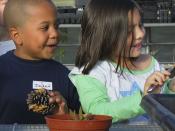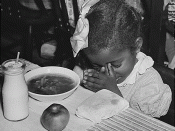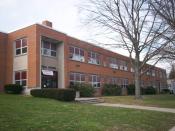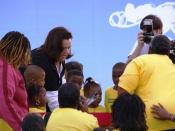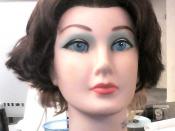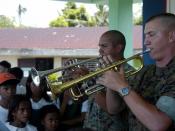The purpose of school-age child care is to provide balanced activities which challenge and enrich a child's life. The program will be planned to complement the job of the home and the school, thereby serving as another vital family resource in our community of the quality child care services that all children deserve. In today's society after-school programs are needed to reduce teenage pregnancy and juvenile crime.
After school programs provide adult supervision that is needed to keep our children out of trouble. As stated by Ellen Goodman in the Herald Dispatch, "Most teenage pregnancies and juvenile crimes occur between the hours of three and six o'clock in the evening ."ÃÂ It seems that both would decrease if more children attended the after-school programs. Many families work or have something important to do after school, causing the child to go home alone. This "free time"ÃÂ that the children are having after is being used to do things that their parents normally do not let them do.
According to the U.S. Census Bureau, providing an after-school program will engage the children with what we know they lack and need the most, that is adult supervision. If children are placed in a type of after-school program then they would receive the adult supervision and support needed to help them in life. In programs I have witnessed locally, I have seen a mutual respect, trust, and honesty which allow the parents and children to feel good about coming to after school care. Some parents worry about sending their children to daycare or after- school programs, but knowing that they are being supervised can put their mind at ease.
Most after-school programs are safe. According to the National Association of Elementary School Principles, while school run programs may meet or exceed licensing standards for programs run by others. April Smith, a teacher at Central City After-School Connection, informed me that the Department of Health and Human Resources come in unannounced throughout the year to make sure that the center is being run up to code. She says, "he/she checks for anything in the room that may cause an accident, makes sure that all hazardous chemicals are locked up, and rooms are kept clean."ÃÂ She also discussed how the staff is required to have certification of CPR and First Aid. At River Valley Child Development the staff must be certified in these areas within the first thirty days from the first date hired. April also informed me that first aid kits and emergency numbers are easy access at the center. She says, "having a first aid kit on site helps in everyday problems and that occur like fever, scratches from falling, bumps or bruises."ÃÂ The first aid kits also help in some major accidents. "Although we would like to believe that no major accidents occur at after-school care, sometimes they are unavoidable,"ÃÂ says April. At most centers children are coached in what to do in an emergency. Not only does coaching them in these types of situations help make a center more safe, but it also enriches the children's minds.
After-school programs provide children with enriching and educational daily activities.
Joyce Maneck, the Associate Editor of School Age Notes, believes "A quality after-school program encourages pro-social behavior through a variety of age appropriate activities planned by children and adults together."ÃÂ The National Association of Elementary School Principles set the guidelines for the majority of programs seem to follow through with a similar pattern of activities for the children. Here is a sample of daily activities used at Central City, provided by a teacher there.
Daily Activities: 2:00 Staff arrives and prepares for children.
2:30 Students arrive, prepare for snack.
3:00 Snack time.
3:30 Outdoor time.
4:00 Outdoor time.
4:30 Homework/Quiet time.
5:00 Reading/Art.
5:30 Indoor play.
6:00 Clean up.
Keep in mind that this a general category, it is up to the specialist at each center to plan daily activities. Not only does the after-school programs provide a good and valuable experience for the children, but it also helps to provide socialization factors.
In after-school programs children are capable of building social skills. Stated in the School Age Notes, young people mentioned socialization as well as homework completion as being important aspects of the after-school program. It also says, " fostering cooperation among a group of children, helping children verbalize their feelings and those of others, developing problem solving approaches to conflicts all are components of the socialization process."ÃÂ When these things are left unattended, it could result in aggressive behavior which could lead to violent and tragic situations. Today there are too many children who do not know how to voice how they feel or know that it is okay to do this. In many of cases this has resulted in the violent outrages that have spread across the country in our high schools. Ellen Clippinger of N.S.A.C.A.
says, "children must first learn pro-social behaviors through positive guidance of adults with whom they come in contact."ÃÂ So if we are not positive and place the children in a positive environment then they might tend to be negative about many things in their life because that is what they are witnessing and learning from us.
We need to take responsibility for our children and teenagers today and get them involved in after-school programs. The more children who attend these programs the more teenage pregnancy and juvenile crime will be reduced. Again, encouraging them to do more productive things with their "free time"ÃÂ will help them greatly with their social behavior and academic abilities.
Sellards 5 Works Cited Bundy, Andrew. "National School-Based Out of School Time Survey."ÃÂ A Report From Parents United For Child Care's Making the Most of Out of School Time. Oct. 1998 Smith, April. Personal Interview. 7 Dec. 1999 Goodman, Ellen. "After-School Programs Will Prevent A Lot of Havoc."ÃÂ Herald Dispatch. 19 April 1998 Grey, Norma. Parents Handbooks Scofield, Richard. "Directors Corner."ÃÂ School Age Notes. June 1998 10:18
